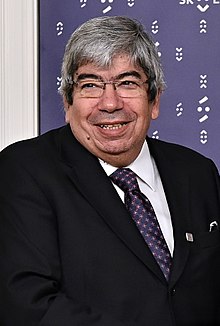Eduardo Ferro Rodrigues
This biography of a living person needs additional citations for verification. (March 2011) |
Eduardo Ferro Rodrigues | |
|---|---|
 | |
| President of the Assembly of the Republic | |
| Assumed office 23 October 2015 | |
| Preceded by | Assunção Esteves |
| Secretary-General of the Socialist Party | |
| In office 20 January 2002 – 24 September 2004 | |
| Preceded by | António Guterres |
| Succeeded by | José Sócrates |
| Leader of the Opposition | |
| In office 6 April 2002 – 24 September 2004 | |
| Prime Minister | José Manuel Barroso |
| Preceded by | José Manuel Barroso |
| Succeeded by | José Sócrates |
| Minister of Social Infrastructure | |
| In office 10 March 2001 – 23 January 2002 | |
| Prime Minister | António Guterres |
| Preceded by | Jorge Coelho |
| Succeeded by | José Sócrates |
| Minister of Labour and Solidarity | |
| In office 25 November 1997 – 10 March 2001 | |
| Prime Minister | António Guterres |
| Preceded by | Maria João Rodrigues (Training and Employment) |
| Succeeded by | Paulo Pedroso |
| Minister of Solidarity and Social Security | |
| In office 28 October 1995 – 25 November 1997 | |
| Prime Minister | António Guterres |
| Preceded by | José Falcão e Cunha (Employment and Social Security) |
| Succeeded by | Position abolished |
| Personal details | |
| Born | Eduardo Luís Barreto Ferro Rodrigues 3 November 1949 Lisbon, Portugal |
| Political party | Socialist Party |
| Spouse(s) | Maria Filomena Lopes Peixoto de Aguilar |
| Children | João Luís Rita |
| Alma mater | School of Economics and Finance, Technical University of Lisbon |
Eduardo Luís Barreto Ferro Rodrigues GCL (born 3 November 1949) is a Portuguese politician and economist who has been President of the Assembly of the Republic since 2015, in the (2015–2019) and 14th Legislatures (2019–present). He was Minister for Social Security, and later Minister for Public Works, in the governments of António Guterres.[1]
Early life and education[]
Born in Lisbon, he obtained the degree of licenciado in economics at what today is the Instituto Superior de Economia e Gestão () of Lisbon University, and is a lecturer in economics at ISCTE - University Institute of Lisbon.
Political career[]
In 2002, Ferro Rodrigues was elected Secretary-General of the Portuguese Socialist Party, a position he retained for two years.[2] He resigned on 9 July 2004, immediately after President Jorge Sampaio announced a decision not to hold early elections when Prime Minister José Manuel Barroso stepped down from office in order to be appointed President of the European Commission.[3] Shortly after, Rodrigues was appointed as Ambassador, Permanent Representative of Portugal to the OECD.[1]
Following the October 2015 parliamentary election, he was elected as President of the Assembly of the Republic on 23 October 2015 with the support of the Socialists, the Communists and the Left Bloc. Ferro received 120 votes against 108 votes for the candidate of the centre-right government.[4]
After the 2019 parliamentary election, Ferro Rodrigues was re-elected as President of the Assembly of the Republic, receiving 178 votes.[5]
Family[]
Married to Maria Filomena Lopes Peixoto de Aguilar, he has two children, João Luís de Aguilar Ferro Rodrigues and a daughter, television presenter .
Honours[]
Portuguese honours[]
 Grand-Cross of the Order of Liberty, Portugal (5 October 2016)[6]
Grand-Cross of the Order of Liberty, Portugal (5 October 2016)[6]
Foreign honours[]
 Grand Cross of the Order of May, Merit Class, Argentina (18 June 2003)[7]
Grand Cross of the Order of May, Merit Class, Argentina (18 June 2003)[7] Grand-Cross of the Order of Charles III, Spain (25 November 2016)[7]
Grand-Cross of the Order of Charles III, Spain (25 November 2016)[7] Grand-Cross of the Order of Honour, Greece (21 April 2017)[7]
Grand-Cross of the Order of Honour, Greece (21 April 2017)[7]
References[]
- ^ Jump up to: a b "Portugal: Ambassador, Permanent Representative to the OECD". Organisation for Economic Co-operation and Development. Archived from the original on 11 March 2011.
- ^ Freire, André; Lobo, Marina Costa; Magalhães, Pedro (2007). Portugal at the polls: in 2002. Lexington Books. pp. 127–128. ISBN 978-0-7391-1563-3.
- ^ Stuart, Paul (21 July 2004). "Portugal's Prime Minister Barroso nominated as European Commission president". World Socialist Web Site. Archived from the original on 11 March 2011.
- ^ "Portugal parliament elects Socialist speaker with support of left", Reuters, 23 October 2015.
- ^ "Ferro Rodrigues reeleito para presidência da Assembleia promete mobilização contra "ameaça climática"". www.dn.pt (in Portuguese). Diário de Notícias. Retrieved 27 October 2019.
- ^ "Cidadãos Nacionais Agraciados com Ordens Portuguesas". Página Oficial das Ordens Honoríficas Portuguesas. Retrieved 31 July 2017.
- ^ Jump up to: a b c "Cidadãos Nacionais Agraciados com Ordens Estrangeiras". Página Oficial das Ordens Honoríficas Portuguesas. Retrieved 31 July 2017.
- Labor ministers
- Portuguese agnostics
- 1949 births
- Living people
- Socialist Party (Portugal) politicians
- Government ministers of Portugal
- Technical University of Lisbon alumni
- Presidents of the Assembly of the Republic (Portugal)
- European economist stubs
- Portuguese people stubs
- Portuguese politician stubs
